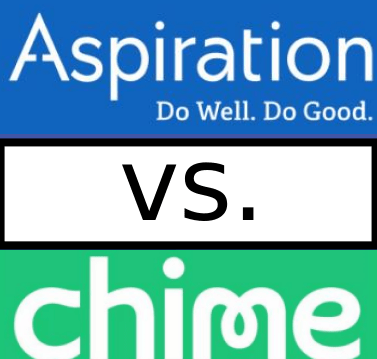Chime vs. Aspiration - Which Bank is Better for You?

Both Chime Bank and Aspiration Bank are great online banks that offer no-fees for basic services, but which is the overall better choice for you?
We hope to give you the information you need to decide for yourself which is better for you — personally we have accounts with both Aspiration Bank and Chime as they both are great banks with great sign-up bonuses, and we believe they’re both trustworthy and far safer/better banks compared to traditional old-school banks — however we prefer Chime for a few reasons we’ll cover below.
Ultimately we’d say Chime is a slightly better choice overall as they offer one of the best savings accounts for free that’s easy to transfer money into from your Chime Bank Account, and they have No FX fees for transactions abroad which is nice if you don’t have a no FX fee credit card — but beyond this both banks are nearly identical.
Which Offers the Best Services/Rates - Aspiration or Chime?
This Category is a bit of a toss-up in our opinion — they both offer pretty much the same services and rates — Chime offers 1% on idle balances in paired savings accounts, while Aspiration offers the same if you have Aspiration Plus account.
Their services are pretty much the same as well — I mean each bank has their own gimmicks, Aspiration offers 0.5% cash-back at certain “eco-friendly” businesses while Chime has some auotmatic savings features, but ultimately both banks offer essentially the exact same services — they just market them differently.
With Aspirations they pretend to plant trees for you, or maybe they actually do plant trees, when you “round-up” purchases and then give you rewards back (generally amounting to the amount rounded up) for the planted trees you’ve allegedly paid to be planted — While with Chime they just flat-out give you the money in your savings account when you select to round-up purchases (optional of course).
Which has less fees - Aspiration or Chime?
We’d say Chime Bank is slightly better in this category — while both Aspiration and Chime are low-cost “no-fee” online banks in truth they do have some fees — it’s just not the basic ones that traditional banks charge simply for not keeping enough money in their accounts, or simply because you have an account with them.
Both Chime and Aspiration’s bank don’t charge such fees — but they still have fees — it’s just the fees they have are for special services or things that aren’t necessary for average people — think Wire Transfers, Foreign Payments, and foreign transactions/atm-withdrawals. For those categories they’re about the same — the only difference is Aspiration gives you $4 back on foreign atm withdrawals while Chime doesn’t, however Chime has no foreign transaction fees, while Aspiration does.
This means in the end they’re about the same, however we think most people would be better off with Chime as most people prefer to pay with card compared to cash now a days, and thus you’ll likely save more with Chime compared to Aspirations if you do travel abroad.
Which Has The Best Signup Bonus Offers - Aspiration or Chime?
In our opinion Chime’s is better, however this depends on you — for us Chime’s bonus is better because it’s easy to transfer a Direct-Deposit payment to them, while for others if that’s not so easy then Aspirations may be easier as it simply requires debit-card spend.
For Aspiration’s Bank all you have to do is sign up through this link or another promotional link and spend either $250+ or $1000+ through the Aspirations debit card within the next 60 days and you’ll get between $50 and $150 (depending on how much you spent). You can read more about Aspirations Promotions here.
Meanwhile for Chime Bank all you have to do is sign up and switch a recurring direct-deposit (such as from your employer) to your new Chime account. It has to be $200 or more and done within the first 45 days of you opening the account — once you receive it you should receive $50 the following day so long as you signed up through someone’s promotional link. You can read more in detail about the promotions Chime offers on this page of our website.
Which is more Trustworthy - Aspiration or Chime Bank?
This may sound like a silly question to some people — but here at GreeneryFinancial we don’t trust most banks — Despite this we’d say both Aspiration and Chime are banks we aren’t petrified to keep some cash in — we don’t think either bank will go bankrupt anytime soon or really ever for that matter, as they don’t engage in risky practices most financial institutions partake in.
They’re both of course legitimate banks and have FDIC-insurance to cover deposits, so they’re as good as any banks — but in our view a little bit safer.
What Advantages does Aspiration have over Chime?
Aspiration offers 1 fee-free atm withdrawal abroad every month which Chime does not — Beyond this there’s no real advantage to Aspiration’s bank other than that their sign-up bonus operates based on spend, and thus is very easy for most people to get without any hassle.
This of course isn’t to say Aspirations isn’t a good choice — Chime doesn’t have many advantages to Aspirations either — they’re both very competitive with one another and are good online banks, it’s just it’s quite hard to differentiate yourself in the banking industry after a certain point. If you feel like Aspirations is right for you or you simply want to snag the sign-up bonuses they offer check out the promotions they’re running here and give them a go.
What Advantages does Chime have over Aspiration Bank?
Chime offers no foreign exchange fees on foreign transactions made with your bank card and they also offer a tasty (alright quite pitiful, but better than other banks) interest rate at a whopping 1% per year, but otherwise they’re pretty much the same as Aspirations — with spending round-ups to help with savings, no fees at 30,000+ atms in the USA, and no maintenance fees or any nonsense like that.
Of course Chime also have a great sign-up bonus that offers $50 for a simple $200 direct-deposit, so the account is pretty much a no-brainer in our view, even if you’ll only use it as a secondary bank account rather than your primary — although it’s a good primary account as well.


